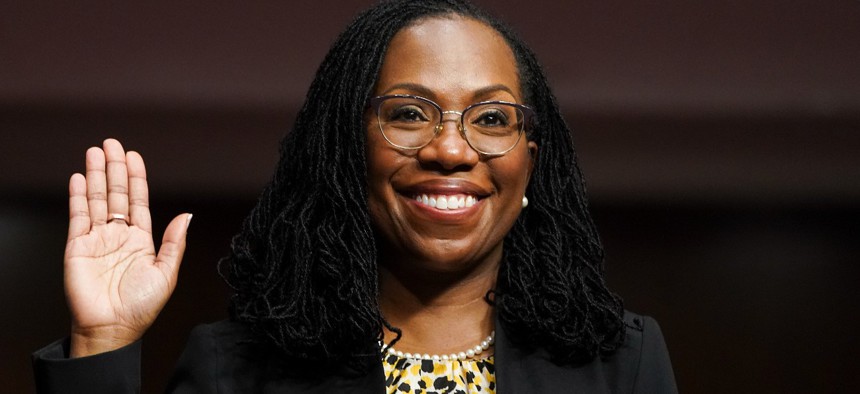
Pool/Getty Images
This Contender for Biden’s Supreme Court Pick Has a History with Feds
U.S. Circuit Court Judge Ketanji Brown Jackson presided over federal employee unions’ effort to overturn a series of anti-labor executive orders during her tenure at the Washington, D.C., District Court.
One of the frontrunners to replace retiring Supreme Court Justice Stephen Breyer has a name that may be familiar to federal employees.
Breyer, who served 27 years on the court, is expected to announce his retirement at an event with President Biden Thursday. The news was first reported by NBC News.
Ketanji Brown Jackson has been frequently named as a potential Supreme Court choice for Biden since he nominated her for a position on the U.S. Court of Appeals for the D.C. Circuit last year. Biden also said he would nominate a Black woman to the Supreme Court during his campaign to become president. Additionally, she served as a clerk for the retiring justice.
Brown Jackson was confirmed to her appellate court post last June by a 53-44 vote. She won the support of Sens. Susan Collins, R-Maine, Lisa Murkowski, R-Alaska, and Lindsey Graham, R-S.C., in addition to every Democrat.
Her experience with federal workforce issues dates back to her tenure on the U.S. District Court for the District of Columbia. In 2018, she presided over federal employee unions’ lawsuit challenging the legality of a trio of executive orders aimed at making it easier to fire federal employees and significantly restraining how unions can collectively bargain and represent employees, signed by President Trump in May of that year.
In her decision, Brown Jackson concluded that the executive orders conflicted with the 1978 Civil Service Reform Act, because they disregarded Congress’ conclusion that good-faith labor-management relations are in the public interest and improperly “eviscerated” feds’ collective bargaining rights.
"As to the merits of the unions’ contentions, while past precedents and pertinent statutory language indicate that the president has the authority to issue executive orders that carry the force of law with respect to federal labor relations, it is undisputed that no such orders can operate to eviscerate the right to bargain collectively as envisioned in the [statute]," she wrote. "In this Court’s view, the challenged provisions of the executive orders at issue have that cumulative effect."
The Trump administration appealed the ruling, and in 2019 a three-judge panel reversed the decision on procedural grounds, finding instead that unions must first challenge the executive orders before the Federal Labor Relations Authority. When Biden took office, he rescinded the edicts and expanded agencies’ collective bargaining obligations to include permissive, non-mandatory subjects.
Breyer is expected to continue serving on the Supreme Court bench until his successor is confirmed by the Senate.







